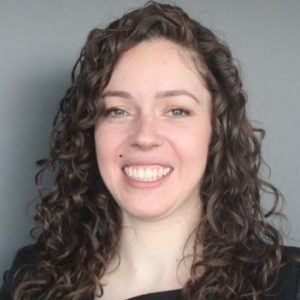
This past Ada Lovelace Day, a day celebrating the achievements of women in STEM, CBR’s Ellie Burns caught up with Becky Plummer, Senior Software Engineer at Bloomberg London, who revealed her achievements, motivations and top tips for women starting in IT.
EB: What have been your most significant recent achievements in the IT industry?
BP: At Bloomberg, we build technology solutions for the financial industry. These solutions provide massive amounts of real time data, financial analytics, advanced tools and applications for a variety of professionals throughout the global financial industry, who find our technology indispensable for their daily work.
Among our 5,000+ software engineers, our application developers are always trying to ensure that the wide variety of applications we offer work in an integrated fashion to help make our clients’ workflow more seamless. Each application is managed by its own team, so delivering a more integrated offering often starts with working more collaboratively across teams.
To this end, seven years ago we launched an initiative to help developers break down silos and better work and share information across teams at Bloomberg. We call it the Champions (or Champs) Program. The program, which I oversee, consists of 400-450 developers spread across different teams in our Engineering department. Each of the Champs is recognized for their technical expertise, knowledge of best practices at Bloomberg and ability to collaborate with others across team lines.

They regularly go beyond their day-to-day responsibilities to improve the development environment by delivering impactful tools and/or collaborative processes. Champs have the freedom to pick any project they want, as long as it improves the company’s development experience.
As the Champs Program took hold and evolved, we saw a massive cultural change that we now know is InnerSource (I recently presented on this topic at the Grace Hopper Celebration in Orlando, FL). In essence, we’ve taken the core ideas of open source software development – transparency of code, public communication, and mentorship – and applied it within the organization.
As teams request help from the Champs to improve specific tools and processes, we allow the person that has the idea to be mentored by the team that maintains that particular application. While our specific Champion model may not work for every organization (it certainly works here), InnerSource can be a powerful model for any organization.
EB: Tell us about your current role. What motivates you? What has been the driving force behind your career strategy?
BP: Throughout my career, I’ve been focused on collaboration between developers, something which has helped me create and realize many opportunities.
If you think about the stereotypical developer that you see in movies, there are usually a bunch of machines in a really dark doom. There are soda cups strewn everywhere. They’re wearing big headphones and they’re hacking away alone. This could not be more different than the day-to-day reality of today’s developers, who frequently work collaboratively as part of a team.
In reality, collaboration is the core to any successful career. Consider how you talk to your co-workers, how you negotiate, how you debate with others when you think your idea is better than theirs, and how you try to stay dispassionate and bring evidence to the discussion. Now think about how well teams collaborate with other teams. How do you negotiate those lines and drive improvements in their workflow? Collaboration is something that’s truly driven me and it’s something I’ve been fortunate and skilled to be able to help with.
I’m the kind of person who, if some people are having an animated and excited discussion and they’re on a different team than me, will walk over and ask them what they’re working on. I’ve helped people debug problems just because I’ve walked by when they’re in those discussions. The way I see it: we’re all stronger together, especially if we bring in the right people and expertise.
EB: What is your proudest achievement to date?
BP: That’s a big question, but I’ll focus on the two moments in my career where I felt the proudest.
One of my most exciting moments was when I was working on a development team here at Bloomberg, where I was responsible for our Voice Confirmation (VCON) platform. One of the projects I worked on was trade alerts. I remember the day my product leader took me to meet a client, and I saw a trader right in front of me receive one of the alerts I had written and actually act on it.
Seeing something I had created actually being used, actually impacting behavior, was one of the most exciting and powerful things to witness. You truly see the fruits of your labor, which is awesome.
Then, there was the time we were seeing periodic connectivity issues. We always want to ensure a seamless experience for our clients. Despite the fact that we had other things going on that needed to be completed per our business strategy, I felt so strongly about delivering an improved experience for the customer. So I stood up and said “I think it’s really important for us to focus on this particular initiative right now – and I’m going to do that.”
That was the first time I was able to decide what I would be working on. In that moment, I felt I had found my voice as a lead engineer. I could determine my focus and really have a meaningful impact on our customers.
EB: What are the biggest lessons you have learned in your career?
BP: The first is technical, while the second is more cultural.
The number one lesson I have learned in my career: production software is a different animal. It’s like a living, breathing being. When it’s in production, software needs to run continuously, indefinitely.
Bloomberg software impacts the world’s financial markets. We need to be 100% sure that what we are putting out there into production is quality, resilient and fault tolerant. The importance of a robust development lifecycle can’t be overstated. Test your code. Again. And again.
The other thing I’ve learned is the importance of having great debate skills. This has less to do with software engineering, but extends across every aspect of working in a team.
Ideas are everything. For the best ideas to thrive, we need to have the ability to debate and challenge ideas in a non-confrontational and non-personal manner. This is an incredibly important skill and I don’t think it’s something many of us learned.
The ability for a developer to get in and change another team’s software – all while communicating priorities, urgency and requirements – in a collaborative way, is definitely something that we need more of in our industry.
Healthy debate also speaks to the significance of diversity – working in an open and inclusive environment. We need to make the environment good for all engineers – not just women, but people of all cultural backgrounds – where we have the skills needed to communicate a non-confrontational and inclusive manner.
EB: How would you encourage more women into the IT sector?
BP: It’s important for all of us – and especially young women – to realize technology is in everything now.
For young women who want to solve problems, to be able to link that passion to a particular interest area… guess what? Every day, we work to solve exciting, challenging problems. Any problem that’s really out there to solve, any area where you have a passion to create something new, is going to involve technology. Getting into software engineering, the potential is almost limitless.
Also, one of the things I hear from some of the women I know – they think working in the software industry is too hard. I want to get out there and tell them it’s not as hard as they think. Part of the battle is changing attitudes in our education system. Learning programming as a skill should be as fundamental as taking physical education. When you get out into the industry, there are just so many ways it can be applied that may not be obvious from the outset.
EB: Why are you so passionate about what you do? What is your motivation, what is your inspiration?
BP: I love what I do at Bloomberg, but I’m also a user of technology. I love my iPhone, my Fitbit, my Roomba. As I’m both a consumer and software engineer, I see no limit in terms of what we can do. I’m really excited about the future, and I realize that the more diverse people we have working together – we’re going to keep pushing the boundaries and developing incredible technologies.
I want to inspire as many people as I personally can to enter this industry, because that means there will be amazingly cool gadgets and awesome platforms that I’m going to be able to play with.







